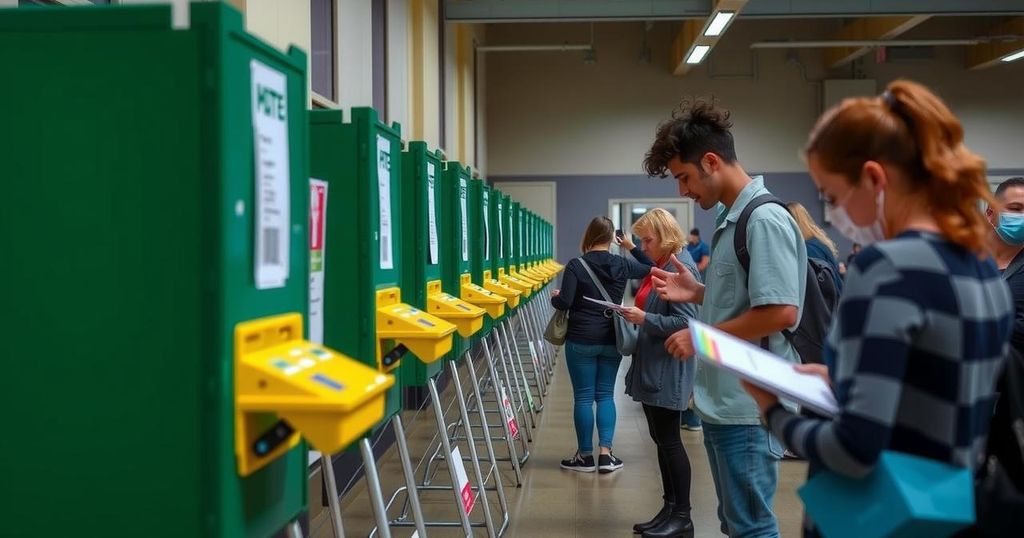Ireland Votes in Critical Election Amid Economic and Social Challenges
Ireland’s parliamentary election, occurring on November 29, 2024, involves 3.8 million voters choosing 174 lawmakers. The ruling coalition of Fine Gael and Fianna Fail faces challenges from Sinn Fein as public discontent over the cost of living and housing shortages intensifies. A continued coalition is projected as the most probable outcome, reflecting a split voter base and a shift in political engagement amid growing tensions around immigration.
On Friday, November 29, 2024, Ireland is conducting a parliamentary election that will determine its next government amidst a backdrop of economic challenges and rising public discontent. Polling stations opened at 7 a.m. local time, allowing the nation’s 3.8 million voters to choose from 174 candidates for the Dail, Ireland’s lower house of parliament. The key parties in contention are the ruling coalition of Fine Gael and Fianna Fail, alongside the significant opposition party, Sinn Fein. This election will reveal whether incumbent parties can survive amid public unrest over the cost of living, housing shortages, and immigration issues. Analysts predict a continued coalition between Fine Gael and Fianna Fail remains the most probable outcome, with coalition dynamics being influenced by minor parties and independent candidates.
The political landscape in Ireland has long been dominated by Fine Gael and Fianna Fail, two parties with rival origins tracing back to the civil war of the 1920s. In the 2020 election, these parties formed a coalition due to a fragmented political scene that left no clear winner; they shared power by alternating the position of Taoiseach, the prime minister. Current Taoiseach Simon Harris of Fine Gael succeeded Micheal Martin of Fianna Fail, who served the initial half term. Also significant is Sinn Fein, which emerged strongly during the last election but has been sidelined from power due to historical grievances surrounding its leftist ideology and ties to the Irish Republican Army.
This election is particularly crucial as it takes place against a backdrop of voter frustration with rising household expenses, particularly concerning housing availability, which has been a prominent issue throughout the campaign. Ireland faces a severe housing crisis stemming from a combination of historical underbuilding and more recent economic challenges. Public sentiment around this issue has only intensified, with escalating property prices and homelessness becoming increasingly politicized topics. Immigration has also emerged as a significant factor, as thousands of new arrivals, particularly asylum seekers, continue to overwhelm housing resources, leading to protests and tensions in Dublin.
Current opinion polls suggest a division of voter support among the leading parties: Fine Gael, Fianna Fail, Sinn Fein, minor parties, and various independents, all competing for a stake in the Dail. While Sinn Fein has claimed to be gaining momentum, analysts project that a renewed coalition between Fine Gael and Fianna Fail is the most likely scenario, possibly supplemented by smaller parties gaining essential seats. Political experts suggest that the coming days will reveal how effectively these parties can form a cohesive government. Exit polls will provide initial election outcome insights after the polls close at 10 p.m. local time on Friday, with ballot counting to commence the following day.
The importance of the November 2024 election in Ireland is underscored by the current political climate, which is characterized by a robust debate on economic conditions and public services. Following the unprecedented strains caused by the COVID-19 pandemic and subsequent global instability, citizens are now closely evaluating their government’s performance on critical issues such as the rising cost of living and housing accessibility. Furthermore, the presence of numerous independent candidates and smaller parties highlights a shift in voter engagement and the evolving dynamic of Irish politics. Understanding the historical context of the main parties aids in grasping the significance of this election, as Fine Gael and Fianna Fail have shared power through coalitional governance—a strategic necessity following recent elections that revealed no decisive victor. With immigration becoming an increasingly prominent matter, this election provides an opportunity for voters to express their concerns over how their government is handling demographic changes, especially in the context of asylum seekers. This backdrop of rising tension, both socially and economically, frames the critical decisions facing voters at the polls.
In summary, the upcoming parliamentary election in Ireland represents a pivotal moment for its voters amidst a complex interplay of economic challenges, political alliances, and social tensions. Fine Gael, Fianna Fail, and Sinn Fein are key players in this election, while numerous independent candidates are also introducing new dynamics into the electoral landscape. As voters head to the polls, the results will not only shape the next government but also reflect the public’s sentiments regarding pressing issues such as housing and immigration. The anticipated coalition outcomes will necessitate careful negotiation and strategic alignment among the parties involved, marking a significant turning point in Irish governance.
Original Source: apnews.com




Post Comment